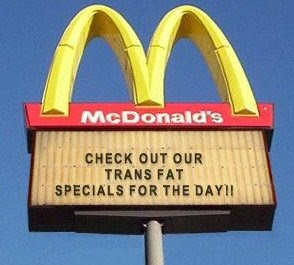So what is a Trans FAT??
A trans fat is a manufactured fat produced by food manufacturers to improve the taste, shelf life and texture of foods. It refers to the unsaturated fats that you see on food labels, they are a combination of monounsaturated or polyunsaturated fats. Trans fats are very harmful to your health, increasing the risk of heart disease, high blood pressure and they are also the main cause of clogged arteries. Trans Fats are so dangerous that many fast food chains are now starting to cut them out of their food, companies such as Burger King, Pizza Hut and McDonalds have realized the dangers. However this does not mean there is no danger! they are aware of the dangers however trans fats are still present, for example you could leave a Happy Meal on the shelf in the sun for 2 months and there will be no decomposition and the food will still be edible, (does this sound healthy)???
Health Promoting Fats
These Healthy Fats are called Linoleic acid (LA), Gamma linolenic acid (GLA), arachidonic acid (AA), alpha linolenic acid (ALA), docosahexaenoic acid (DHA) and eicosapentaenoic acid (EPA). Fatty Acids are needed by the body for many different functions including your skin, respiratory and circulatory system, also your brain and organs. It is also vital for the absorption of essential Vitamins A,D,E,K with Vitamin D being the most vital vitamin in the body with over 300 different functions. The two Fatty Acids the body cannot produce are the Omegas 3 and 6.
Omega 3 plays a vital role in Brain function and is found in Oily Fish such as Mackerel, Salmon, Herring and Tuna. Fish should play a role in our daily diet apart from Tuna due to its high Mercury levels.
Omega 6 plays a vital role when it comes to the prevention of health problems such as Arthritis, Osteoarthritis, High Cholesterol and digestive difficulties. Good sources of Omega 6 would include Flaxseed, Walnuts, Pumpkin seeds and Raw leafy Vegetables.
Here’s a table to help you understand the types of fats and the categories they fit into.
Monounsaturated
|
Polyunsaturated
|
Saturated
|
Trans Fat
|
Olive, Canola and peanut oil
|
Herring
|
Meat
|
Margarine
|
Nuts
|
Mackerel
|
Poultry
|
Cookies
|
Avocados
|
Salmon
|
Butter
|
Pastries
|
Sardines
|
Cheese
|
Fried foods
| |
Walnuts
|
Cream
| ||
Sunflower oil
|
Coconut oil
| ||
Nuts and seeds
| |||
10% of your fat calories
|
10% of your fat calories
|
10% of your fat calories
|
This should be low in the diet
|
A good way to add Health Promoting Fats to your diet is through quality Omega Supplements including fish oils, Cod Liver Oil should be avoided!!! Adding Pine Nuts, Avocado and Olive Oil is a great addition to many meals and they taste great.
Hopefully I have made you more aware about the different types of fats but also educated you that not all fats are bad and some are essential so don’t avoid fat, fat is your friend!!!







